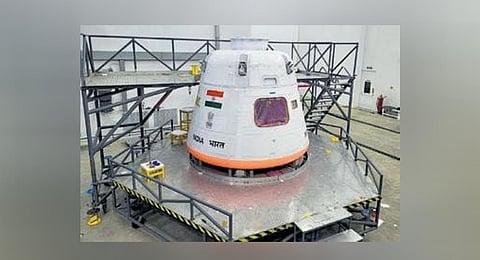

BENGALURU: The Indian Space Research (ISRO) is gearing up to launch Ganganyaan Mission’s Flight Test Vehicle Abort Mission-1 (TV-D1) on October 21 from the Satish Dhawan Space Centre in Sriharikota. The 2-hour-long test will take place between 7 am to 9 am, announced the space agency on Monday. The test will demonstrate the safety of the vehicle for the human space flight mission in future.
“Mission Gaganyaan: The Test Vehicle Development Flight (TV-D1) test flight is scheduled for October 21, 2023, between 7 am and 9 am from SDSC-SHAR, Sriharikota,” said ISRO on platform X. Earlier on Saturday, ISRO Chairman S Somanath said three more test vehicle missions would be launched under the Gaganyaan programme after the TV-D1 test flight on October 21.
According to ISRO, the test vehicle is a single-stage liquid rocket developed for this abort mission. The payloads consist of the Crew Module (CM) and Crew Escape System (CES) with their fast-acting solid motors, along with CM fairing (CMF) and Interface Adapters.
Scientists said that the Test Vehicle mission with CM is a significant milestone for the overall Gaganyaan programme “as a near-complete system is integrated for a flight test.” The success will set the stage for the remaining tests and unmanned missions.
The TV-D1 test flight involves launching the unmanned crew module to outer space, bringing it back to earth and recovering it after a touchdown in the Bay of Bengal, using a dedicated vessel and diving team from the Indian Navy. The landing will be about 10 km from the coast of Sriharikota., ISRO had informed earlier.
India’s ambitious and first human space flight–the Gaganyaan Mission will be launched with a crew of three members to an orbit of 400 km for three days scheduled for late 2024 or early 2025.